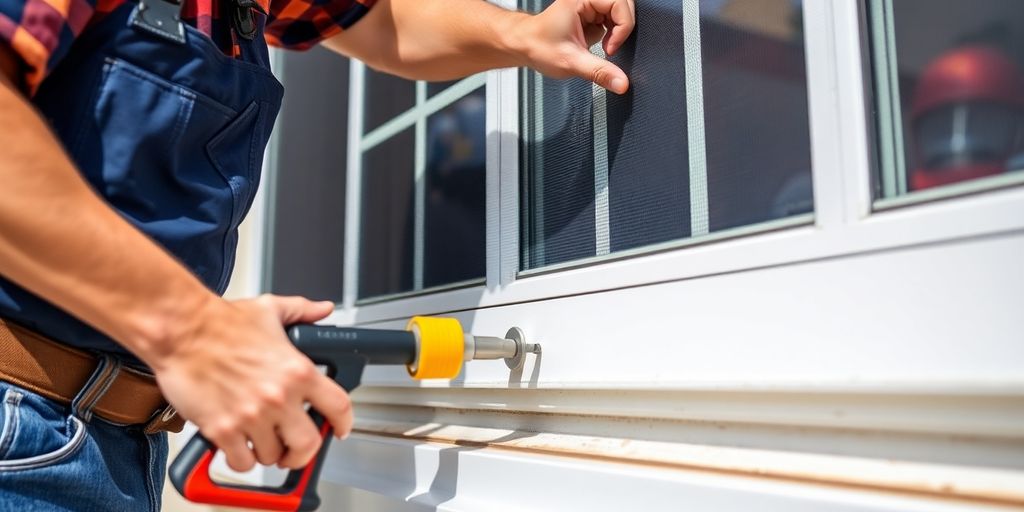
Finding the Best Options: Who Rescreens Windows Near Me?
If you're looking to keep your home comfortable and bug-free, window rescreening is a smart choice. This article will guide you through why rescreening is important, the types of screens available, and how to find the best service near you. Whether you choose to do it yourself or hire a pro, understanding the options can help you make the right decision for your home.
Key Takeaways
- Window rescreening helps keep bugs out and improves your home's look.
- There are different types of screens, including those for pets and sun control.
- Choosing the right service involves checking reviews and asking questions.
- DIY can save money, but professional help ensures quality work.
- Regular maintenance can extend the life of your screens.
Understanding the Importance of Window Rescreening
Why Rescreening is Essential
Window rescreening is crucial for maintaining a comfortable and safe home environment. Old or damaged screens can let in insects and dust, compromising your indoor air quality. Regularly rescreening your windows helps keep your home clean and pest-free.
Common Issues with Old Screens
Old screens can develop several problems, including:
- Tears and holes that allow bugs to enter.
- Rust or corrosion that weakens the frame.
- Fading or discoloration that affects your home's appearance.
Benefits of Professional Rescreening
Choosing a professional service for window rescreening offers numerous advantages:
- Expert installation ensures a perfect fit.
- Access to high-quality materials that last longer.
- Saves you time and effort compared to DIY methods.
Regular maintenance of your window screens can prevent costly repairs in the future.
In summary, understanding the importance of window rescreening can help you maintain a comfortable and safe living space. Don't overlook the benefits of keeping your screens in top condition!
Types of Window Screens Available
When it comes to window screens, there are several options to choose from. Each type serves a different purpose and can enhance your home in various ways. Choosing the right screen can make a big difference in comfort and protection.
Standard Window Screens
- Made from durable materials like fiberglass or aluminum.
- Designed to keep insects out while allowing fresh air in.
- Commonly used in most homes.
Pet-Resistant Screens
- Specially designed to withstand scratches and tears from pets.
- Made from stronger materials to ensure longevity.
- Ideal for homes with cats or dogs that like to scratch at screens.
Sun Control Screens
- Help reduce glare and heat from the sun.
- Can lower energy costs by keeping your home cooler.
- Available in various colors to match your home’s decor.
Golf Ball Protection Screens
- Designed to withstand impacts from golf balls and other projectiles.
- Made from heavy-duty materials for extra strength.
- Perfect for homes near golf courses or areas with high activity.
| Type of Screen | Key Features | Best For |
|---|---|---|
| Standard Window Screens | Durable, insect protection | Most homes |
| Pet-Resistant Screens | Scratch-resistant, strong materials | Homes with pets |
| Sun Control Screens | Reduces glare, energy-efficient | Sun-drenched areas |
| Golf Ball Protection Screens | Heavy-duty, impact-resistant | Homes near golf courses |
Choosing the right type of window screen can enhance your home’s comfort and protect it from the elements.
By understanding the different types of window screens available, you can make an informed decision that best suits your needs.
Choosing the Right Service for Window Rescreening

When it comes to window rescreening, selecting the right service is crucial. Here are some key factors to consider:
Factors to Consider
- Experience: Look for companies with a solid track record in window rescreening.
- Materials Used: Ensure they offer high-quality materials that suit your needs, such as pet-resistant or sun control screens.
- Customer Reviews: Check online reviews to gauge customer satisfaction.
Comparing Local Services
| Service Provider | Years in Business | Customer Rating |
|---|---|---|
| Screenmobile | 20 | 4.8/5 |
| Local Rescreening | 5 | 4.2/5 |
| Window Experts | 10 | 4.5/5 |
Questions to Ask Before Hiring
- What types of screens do you offer?
- Can you provide references from past clients?
- What is your warranty policy?
Choosing the right service can save you time and money in the long run. Make sure to do your research before making a decision!
DIY vs. Professional Window Rescreening

Pros and Cons of DIY
Choosing to rescreen your windows yourself can be a rewarding experience. Here are some advantages and disadvantages:
Pros:
- Cost Savings: Doing it yourself can save you money on labor costs.
- Flexibility: You can work at your own pace and schedule.
- Learning Opportunity: It’s a chance to learn a new skill.
Cons:
- Time-Consuming: It may take longer than expected.
- Skill Level: If you lack experience, mistakes can happen.
- Tools Required: You might need to buy or rent special tools.
When to Call a Professional
Sometimes, hiring a professional is the best choice. Consider these situations:
- Extensive Damage: If the window frame is damaged, a pro can fix it.
- Time Constraints: If you’re busy, a professional can save you time.
- Quality Assurance: Professionals ensure a high-quality finish.
Cost Comparison
Here’s a simple table comparing DIY and professional costs:
| Method | Estimated Cost |
|---|---|
| DIY | $50 - $150 |
| Professional | $100 - $300 |
In summary, deciding between DIY and professional rescreening depends on your skills, time, and budget.
Remember, if you choose to go the DIY route, having the right tools, like the Caldwell Spirex & Spiro-Mite tensioning tool, can make the job easier and more effective!
Finding Local Window Rescreening Services
When it comes to window rescreening, finding the right service nearby is crucial. Local services can provide quick and efficient solutions to your screen problems. Here are some effective ways to locate these services:
Using Online Search Tools
- Search Engines: Use Google or Bing to find window rescreening services in your area. Just type "window rescreening near me".
- Local Directories: Websites like Yelp or Angie's List can help you find reputable services with customer reviews.
- Social Media: Platforms like Facebook often have local business listings and community recommendations.
Reading Reviews and Testimonials
- Look for customer feedback on service quality and reliability.
- Pay attention to ratings and comments about the timeliness of service.
- Check for before-and-after photos to gauge the quality of work.
Checking Credentials and Certifications
- Ensure the service provider has the necessary licenses and insurance.
- Ask about their experience and any certifications in window rescreening.
- Verify if they use high-quality materials, such as those found in wrs amesbury block and tackle balances for non-tilt windows.
Finding a trustworthy local service can save you time and ensure your windows are properly rescreened, enhancing your home's comfort and appearance.
What to Expect During a Professional Rescreening Service
Initial Consultation and Estimate
When you decide to have your windows rescreened, the first step is an initial consultation. During this visit, a technician will assess your current screens and discuss your needs. They will provide an estimate based on the type of screens you want and the work required. Here are some key points to consider:
- Assessment of existing screens
- Discussion of screen options
- Detailed cost estimate
The Rescreening Process
Once you agree to the estimate, the actual rescreening process begins. The technician will arrive with all the necessary tools and materials. Here’s what typically happens:
- Removal of old screens: The technician carefully takes out the damaged screens.
- Preparation: They clean the frames and check for any damage that needs fixing.
- Installation of new screens: New screens are fitted securely into the frames.
This process ensures that your windows are protected from insects and the elements.
Post-Service Maintenance Tips
After the rescreening is complete, the technician will provide you with maintenance tips to keep your screens in good shape. Here are some helpful suggestions:
- Regularly clean the screens to prevent dirt buildup.
- Inspect for any signs of wear or damage.
- Schedule a professional check-up every few years to ensure longevity.
Keeping your screens well-maintained can extend their lifespan and improve your home’s comfort.
In summary, understanding what to expect during a professional rescreening service can help you feel more prepared and satisfied with the results. Whether it’s the initial consultation, the rescreening process, or post-service care, being informed makes a difference!
Maintaining Your Rescreened Windows
Regular Cleaning Tips
To keep your rescreened windows in great shape, follow these simple cleaning tips:
- Use a soft brush to remove dust and debris from the screens.
- Wash with mild soap and water to avoid damaging the material.
- Rinse thoroughly to ensure no soap residue is left behind.
Identifying Early Signs of Wear
It's important to check your screens regularly for any signs of damage. Look for:
- Tears or holes in the mesh.
- Loose frames that may need tightening.
- Discoloration or fading of the screen material.
When to Schedule the Next Rescreening
To maintain the quality of your windows, consider rescreening every few years. Here are some factors to help you decide:
- Age of the screens: If they are over five years old, it might be time.
- Visible damage: If you notice significant wear, don’t wait.
- Seasonal changes: Schedule before summer to keep bugs out.
Keeping your screens well-maintained not only enhances your home's appearance but also ensures they function effectively for years to come. Regular care can prevent costly repairs later.
Final Thoughts on Finding Window Rescreening Services
In conclusion, when it comes to fixing or replacing window screens, it's important to choose a reliable service. Screenmobile stands out as a great option because they bring their services right to your home. With years of experience, they know how to get the job done well. They offer different types of screens to meet your needs, whether you have pets or want to block the sun. If your screens are damaged, don’t wait too long to get them fixed. You can easily find a Screenmobile location near you and get a free estimate. Keeping your windows screened not only makes your home look better but also keeps bugs out. So, take the first step today and enjoy the comfort of well-maintained window screens!
Frequently Asked Questions
What is window rescreening and why is it important?
Window rescreening is the process of replacing or fixing the screens on your windows. It's important because it helps keep bugs out and allows fresh air in while protecting your home.
How do I know when my window screens need to be replaced?
If your screens have holes, tears, or are falling apart, it's time to replace them. Also, if they don’t fit well anymore, they should be changed.
Can I rescreen my windows myself?
Yes, you can! But it can be tricky. If you're not sure, it might be better to hire a professional to make sure it's done right.
What types of screens can I choose from?
There are many types of screens available, like standard screens, pet-resistant screens, and screens that block sunlight or even golf balls.
How do I find a good window rescreening service near me?
You can search online for local services, read reviews, and ask friends for recommendations to find a reliable window rescreening service.
What should I expect during a professional rescreening service?
A professional will usually start with a consultation to assess your needs, provide an estimate, and then carry out the rescreening process efficiently.
